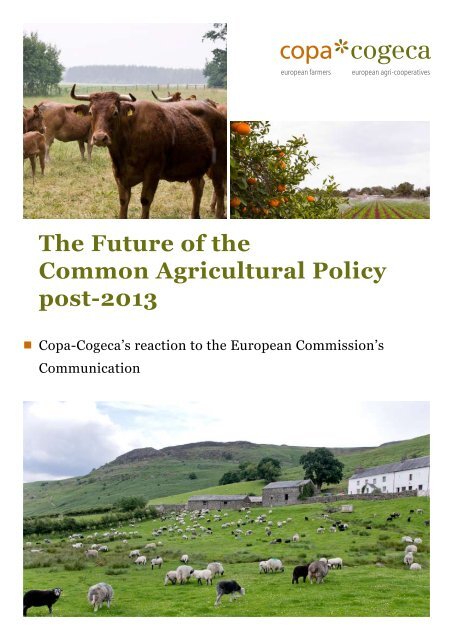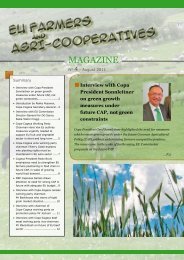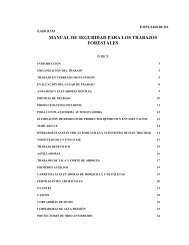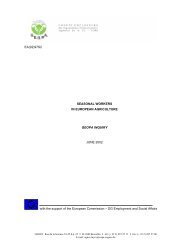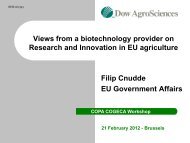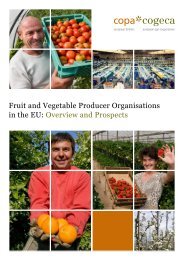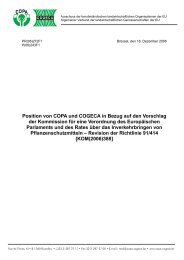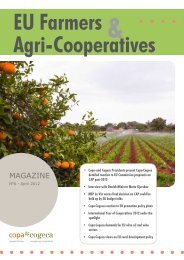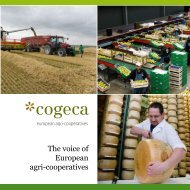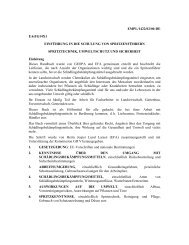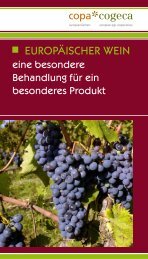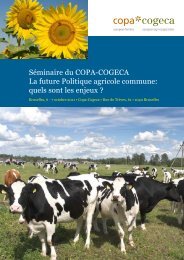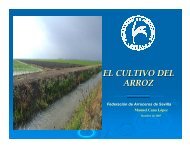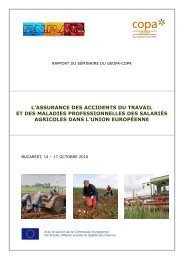The Future of the Common Agricultural Policy post ... - Copa-Cogeca
The Future of the Common Agricultural Policy post ... - Copa-Cogeca
The Future of the Common Agricultural Policy post ... - Copa-Cogeca
Create successful ePaper yourself
Turn your PDF publications into a flip-book with our unique Google optimized e-Paper software.
<strong>The</strong> <strong>Future</strong> <strong>of</strong> <strong>the</strong><br />
<strong>Common</strong> <strong>Agricultural</strong> <strong>Policy</strong><br />
<strong>post</strong>-2013<br />
<strong>Copa</strong>-<strong>Cogeca</strong>’s reaction to <strong>the</strong> European Commission’s<br />
Communication<br />
1
<strong>Copa</strong>-<strong>Cogeca</strong>’s reaction to <strong>the</strong> European Commission’s Communication 1<br />
SUMMARY<br />
<strong>Copa</strong>-<strong>Cogeca</strong> welcomes <strong>the</strong> Commission’s recognition <strong>of</strong><br />
<strong>the</strong> overwhelming public support for a strong <strong>Common</strong><br />
<strong>Agricultural</strong> <strong>Policy</strong> (CAP) <strong>post</strong>-2013. But we are seriously<br />
concerned by <strong>the</strong> lack <strong>of</strong> concrete proposals to ensure that<br />
<strong>the</strong> EU agricultural sector can fulfil society’s expectations in<br />
an increasingly uncertain world and contribute positively<br />
to <strong>the</strong> EU’s 2020 goals <strong>of</strong> growth and jobs.<br />
<strong>The</strong> past four major reforms <strong>of</strong> <strong>the</strong> CAP have all<br />
concentrated on ensuring that EU farmers meet <strong>the</strong><br />
highest standards in <strong>the</strong> world on food traceability,<br />
environmental protection and animal welfare. This has<br />
led to a serious deterioration in <strong>the</strong>ir competitive position<br />
vis-à-vis imports which are not required to meet <strong>the</strong>se<br />
standards. On top <strong>of</strong> this, farmers have suffered from a<br />
very weak bargaining position faced with a handful <strong>of</strong> very<br />
large food processers and retailers.<br />
As a result farmers’ income today is only 50% <strong>of</strong> average<br />
earnings and two-thirds <strong>of</strong> this income is directly<br />
dependent on budgetary support.<br />
This is not a sound situation for farmers. Nor is it a sound<br />
situation if we are to ensure consumers with secure and<br />
stable supplies <strong>of</strong> food in <strong>the</strong> face <strong>of</strong> growing world market<br />
volatility and climate change.<br />
Yet <strong>the</strong> Commission’s main new proposal in its<br />
communication is to require farmers to provide additional<br />
environmental services (greening). This will fur<strong>the</strong>r<br />
increase farmers’ costs and weaken <strong>the</strong>ir competitive<br />
position.<br />
<strong>Copa</strong>-<strong>Cogeca</strong> believes that, given <strong>the</strong> challenges ahead,<br />
<strong>the</strong> priority must be to ensure a competitive and dynamic<br />
agricultural sector with emphasis on <strong>the</strong> following<br />
measures:<br />
new tools to deal with increased market volatility<br />
and risk and to streng<strong>the</strong>n <strong>the</strong> competitive position<br />
<strong>of</strong> farmers (e.g. safety nets, market intelligence,<br />
futures, promotion, risk insurance)<br />
<strong>the</strong> reinforcement <strong>of</strong> farmers’ position in <strong>the</strong> food<br />
chain including streng<strong>the</strong>ning <strong>of</strong> <strong>the</strong> economic<br />
organisation <strong>of</strong> farmers and measures to combat<br />
abusive practices<br />
<strong>the</strong> maintenance <strong>of</strong> direct payments under pillar<br />
one <strong>of</strong> <strong>the</strong> CAP but with a review <strong>of</strong> modalities to<br />
ensure fair and equitable treatment <strong>of</strong> all farmers<br />
taking into account difference in conditions<br />
<br />
<strong>the</strong> targeting <strong>of</strong> direct payments to active farmers<br />
<strong>the</strong> maintenance <strong>of</strong> <strong>the</strong> rural development pillar<br />
<strong>of</strong> <strong>the</strong> CAP, including LFA payments, and more<br />
emphasis on improving farm pr<strong>of</strong>itability by<br />
encouraging innovation and knowledge transfer<br />
incentives to enable farmers to provide more in<br />
<strong>the</strong> way <strong>of</strong> environmental and o<strong>the</strong>r public services<br />
(fur<strong>the</strong>r greening) on a voluntary basis under <strong>the</strong><br />
second pillar <strong>of</strong> <strong>the</strong> CAP<br />
climate change to be a cross-cutting <strong>the</strong>me with<br />
<strong>the</strong> emphasis on win-win solutions which improve<br />
<strong>the</strong> farmers’ productivity as well as providing<br />
environmental benefits<br />
more consistency between <strong>the</strong> objectives <strong>of</strong> <strong>the</strong> CAP<br />
for sustainable agriculture and both EU trade policy<br />
and EU competition policy.<br />
A CAP shaped in this way is <strong>the</strong> best guarantee to European<br />
citizens <strong>of</strong> ensuring food security, stability, <strong>the</strong> protection<br />
<strong>of</strong> <strong>the</strong> EU’s valuable natural resources and maximising<br />
agriculture’s contribution to growth and jobs.<br />
Finally, to ensure a CAP which can deliver it will be<br />
essential to maintain <strong>the</strong> CAP budget and <strong>the</strong> principle <strong>of</strong><br />
financial solidarity.<br />
1 Commission’s communication “<strong>The</strong> CAP towards 2020” COM(2010)672 final<br />
2
<strong>Copa</strong>-<strong>Cogeca</strong>’s reaction to<br />
<strong>the</strong> European Commission’s<br />
Communication on <strong>the</strong> <strong>Future</strong><br />
<strong>of</strong> <strong>the</strong> CAP <strong>post</strong>-2013<br />
General remarks<br />
•y <strong>Copa</strong>-<strong>Cogeca</strong> welcome <strong>the</strong> overwhelming support shown in <strong>the</strong> extensive<br />
public debate held earlier in 2010 that <strong>the</strong> future CAP should remain a strong<br />
common policy structured around its two pillars.<br />
•y <strong>Copa</strong>-<strong>Cogeca</strong> also agrees with <strong>the</strong> Commission that <strong>the</strong> three main objectives<br />
<strong>of</strong> <strong>the</strong> CAP will, in future, continue to be:<br />
<br />
<br />
<br />
viable food production, in particular to ensure food security both in<br />
quantity and quality<br />
sustainable management <strong>of</strong> natural resources and<br />
balanced territorial development, in particular to support rural employment<br />
and maintain <strong>the</strong> social fabric <strong>of</strong> rural areas.<br />
<strong>The</strong>se objectives cannot be achieved without farmers and <strong>the</strong>ir farms. Farmers<br />
are <strong>the</strong> ones who produce <strong>the</strong> food. Farmers, toge<strong>the</strong>r with foresters, look<br />
after nearly three-quarters <strong>of</strong> <strong>the</strong> EU’s most important natural resource – land.<br />
And, as <strong>the</strong> Commission recognises, agriculture remains an essential driver <strong>of</strong><br />
<strong>the</strong> rural economy: farms provide employment for 28 million people in rural<br />
areas and are <strong>the</strong> mainstay <strong>of</strong> cooperatives, input providers and <strong>the</strong> agri-food<br />
businesses, most <strong>of</strong> which are based in rural areas.<br />
•y This highlights <strong>the</strong> importance <strong>of</strong> ensuring a sound future for agricultural<br />
production throughout <strong>the</strong> EU and one that attracts young farmers into<br />
farming. This is why <strong>Copa</strong>-<strong>Cogeca</strong> is very surprised and concerned that <strong>the</strong><br />
Commission’s communication lacks any concrete measures to ensure a<br />
competitive and dynamic agricultural sector, ready to meet <strong>the</strong> challenges <strong>of</strong><br />
food security, market volatility and climate change. It is even more surprising<br />
in <strong>the</strong> light <strong>of</strong> <strong>the</strong> Commission’s budget review which emphasises <strong>the</strong><br />
important contribution which a sustainable, productive and competitive<br />
agricultural sector could make to <strong>the</strong> Europe 2020 strategy.<br />
Instead, <strong>the</strong> Commission’s main proposal is to require farmers to provide<br />
additional mandatory environmental services with no indication that additional<br />
funding will be available to cover <strong>the</strong> additional costs this will cause. <strong>The</strong> result<br />
will <strong>the</strong>refore simply be a fur<strong>the</strong>r weakening <strong>of</strong> farmers’ competitive position<br />
vis-à-vis third country imports and on <strong>the</strong> world market.<br />
3
•y <strong>The</strong> Commission fails to mention that a series <strong>of</strong> reforms to <strong>the</strong> CAP (1992<br />
McSharry, Agenda 2000 reform, 2003 reform, Health Check reform <strong>of</strong> 2008)<br />
have led to a substantial reinforcement <strong>of</strong> <strong>the</strong> environmental protection role<br />
<strong>of</strong> farmers (through both <strong>the</strong> introduction <strong>of</strong> a swa<strong>the</strong> <strong>of</strong> new environmental<br />
regulations and requirements under cross compliance, as well as agrienvironmental<br />
measures under pillar 2). <strong>The</strong>se reforms have been extremely<br />
challenging for farmers entailing significant changes to <strong>the</strong> production<br />
systems, requiring substantial new investment and causing increased annual<br />
costs.<br />
•y Farmers have also responded positively to calls for <strong>the</strong>m to be more market<br />
orientated by adapting to new market conditions. Yet nothing has been done<br />
during <strong>the</strong>se reforms to ensure that <strong>the</strong>y obtain a fair return from <strong>the</strong> market<br />
for <strong>the</strong>ir production. On <strong>the</strong> contrary, EU trade policy has led to <strong>the</strong> opening<br />
up <strong>of</strong> <strong>the</strong> EU market to more and more imports which are not even required<br />
to meet EU traceability, environmental or animal welfare standards and <strong>of</strong>ten<br />
use products such as types <strong>of</strong> pesticides which are banned in <strong>the</strong> EU. This has<br />
meant significantly higher costs for EU farmers resulting in a loss in market<br />
share both on <strong>the</strong> domestic market and <strong>the</strong> world market in recent years.<br />
<strong>The</strong> facts speak for <strong>the</strong>mselves. Farmers’ income, even in moderately good<br />
years, is only some 50% <strong>of</strong> average earnings and two-thirds <strong>of</strong> this income is<br />
directly dependent upon budgetary support.<br />
•y Farmers want to obtain more <strong>of</strong> <strong>the</strong>ir income from <strong>the</strong> market, Finance<br />
Ministers and taxpayers want farmers to be less dependent on budgetary<br />
support and consumers are increasingly concerned about food security and<br />
stability in a very uncertain and volatile world.<br />
In its proposals published in May 2010, <strong>Copa</strong>-<strong>Cogeca</strong> called for specific concrete<br />
measures which will move <strong>the</strong> CAP in this direction: for example, measures to<br />
ensure more market stability, measures to improve farmers’ position in <strong>the</strong><br />
food chain and measures to improve <strong>the</strong> competitiveness <strong>of</strong> agriculture and to<br />
assist <strong>the</strong>m to make a positive contribution to <strong>the</strong> challenge <strong>of</strong> climate change.<br />
<strong>The</strong>re is a total absence in <strong>the</strong> Commission’s communication <strong>of</strong> anything more<br />
than vague words on all <strong>the</strong>se aspects, while its proposals on reinforcing <strong>the</strong><br />
environmental aspect <strong>of</strong> <strong>the</strong> CAP are far-reaching and specific.<br />
•y Farmers are very willing to respond to <strong>the</strong> environmental and climate change<br />
challenges ahead by providing more in <strong>the</strong> way <strong>of</strong> public services (fur<strong>the</strong>r<br />
greening) but this must be on a voluntary basis under <strong>the</strong> second pillar <strong>of</strong> <strong>the</strong><br />
CAP and, to be successful, <strong>the</strong>re must be real incentives for farmers to<br />
undertake <strong>the</strong> additional work and bear <strong>the</strong> costs.<br />
In sum, <strong>Copa</strong>-<strong>Cogeca</strong> calls upon <strong>the</strong> EU institutions to take a more balanced<br />
•y<br />
approach. <strong>The</strong> concerns <strong>of</strong> citizens for food security and stability, as well as<br />
<strong>the</strong> concerns <strong>of</strong> farmers to obtain more income from <strong>the</strong> market and to make<br />
a real contribution to <strong>the</strong> EU’s 2020 goals for growth, must be taken as<br />
seriously as <strong>the</strong> concerns <strong>of</strong> environmentalists.<br />
4
• y Finally, it is impossible to make a full assessment <strong>of</strong> <strong>the</strong> Commission’s<br />
communication until some <strong>of</strong> <strong>the</strong> ideas put forward by <strong>the</strong> Commission have<br />
been fleshed out in more detail and <strong>the</strong> Commission’s specific proposals for<br />
<strong>the</strong> budget are known.<br />
It will be particularly important to ensure that:<br />
<strong>the</strong> CAP budget and <strong>the</strong> principle <strong>of</strong> financial solidarity is maintained with<br />
no widening <strong>of</strong> co-financing<br />
<br />
<strong>the</strong> CAP remains a common policy without distortions to competition<br />
<strong>the</strong>re is a fair and equitable treatment <strong>of</strong> all farmers taking into account<br />
differences in conditions<br />
all adjustments to <strong>the</strong> CAP pass <strong>the</strong> farmers’ ‘simplification’ test and<br />
<strong>the</strong>re is more consistency between <strong>the</strong> CAP and o<strong>the</strong>r EU policies, notably<br />
trade and competition policy, with greater EU harmonisation <strong>of</strong> <strong>the</strong><br />
latter.<br />
<strong>Copa</strong>-<strong>Cogeca</strong>’s preliminary reaction to <strong>the</strong> more detailed suggestions in <strong>the</strong><br />
•y<br />
Commission’s communication is outlined below.<br />
5
<strong>Copa</strong>-<strong>Cogeca</strong>’s more detailed<br />
comments on <strong>the</strong> Commission’s<br />
favoured CAP Reform<br />
Orientation<br />
<strong>The</strong> two-pillar structure <strong>of</strong> <strong>the</strong> CAP<br />
•y <strong>Copa</strong>-<strong>Cogeca</strong> supports <strong>the</strong> maintenance <strong>of</strong> <strong>the</strong> two-pillar structure but <strong>the</strong><br />
Commission fails to make a clear distinction between <strong>the</strong>ir roles. <strong>The</strong><br />
distinction should reflect policy objectives and not simply accounting<br />
distinctions as suggested by <strong>the</strong> Commission for <strong>the</strong> first pillar (“<strong>the</strong> first<br />
pillar would contain <strong>the</strong> support paid to all farmers on a yearly basis”) and<br />
ensure that <strong>the</strong>y are complementary.<br />
Pillar 1 should be primarily directed at <strong>the</strong> economic production role <strong>of</strong> agriculture,<br />
namely: ensuring food security, market stability, sustainable production,<br />
employment and <strong>the</strong> economic viability <strong>of</strong> rural areas. Since <strong>the</strong>se public benefits<br />
are provided jointly by all farming activity across <strong>the</strong> EU, it follows that<br />
measures under pillar 1 should, in principle, be measures applied across <strong>the</strong><br />
EU, be open to all active farmers who meet <strong>the</strong> eligibility requirements and be<br />
EU funded. Market management tools and direct payments to farmers necessary<br />
to achieve <strong>the</strong>se public benefits should be <strong>the</strong> main components <strong>of</strong> pillar<br />
1.<br />
•y Pillar 2 should be directed at additional measures to achieve <strong>the</strong> three main<br />
CAP objectives but which require flexibility to enable Member States to<br />
respond to specific national or regional conditions.<br />
Direct payments<br />
<strong>The</strong> Commission proposes that <strong>the</strong> future direct payment to farmers under<br />
•y<br />
pillar one should be composed <strong>of</strong> a basic income support payment linked to<br />
cross compliance, a payment coupled to mandatory environmental actions,<br />
toge<strong>the</strong>r with an additional income support to farmers in areas with specific<br />
natural constraints and limited coupled payments.<br />
6
Proposed ‘basic income support’ under pillar 1<br />
•y <strong>Copa</strong>-<strong>Cogeca</strong>, like <strong>the</strong> Commission, considers it to be extremely important<br />
that <strong>the</strong> general public fully understands <strong>the</strong> importance and need for <strong>the</strong><br />
provision <strong>of</strong> direct payments. However, justifying direct payments as an<br />
income aid to farmers is not adequate. <strong>The</strong> justification for pillar 1 payments<br />
is that this is <strong>the</strong> only way to achieve <strong>the</strong> type <strong>of</strong> agriculture European citizens<br />
want: not only food security and stability but also sustainable production and<br />
<strong>the</strong> maintenance <strong>of</strong> agriculture’s vital contribution to employment and <strong>the</strong><br />
economic prosperity <strong>of</strong> rural areas throughout <strong>the</strong> EU.<br />
As recognised by <strong>the</strong> Commission, without <strong>the</strong>se payments <strong>the</strong>re would be<br />
concentration <strong>of</strong> production, more intensification, land abandonment leading<br />
to increased environmental pressures, <strong>the</strong> loss <strong>of</strong> habitats and an irreversible<br />
deterioration <strong>of</strong> European production capacity. This is why pillar 1 payments<br />
must be maintained.<br />
• y <strong>Copa</strong>-<strong>Cogeca</strong> supports <strong>the</strong> need to ensure a fair and equitable treatment<br />
<strong>of</strong> all farmers taking into account differences in conditions. More details<br />
are required before it can be assessed whe<strong>the</strong>r <strong>the</strong> Commission’s proposal<br />
will achieve this and in a way which does not put <strong>the</strong> survival <strong>of</strong> farmers at<br />
risk.<br />
•y Since direct payments ensure <strong>the</strong> provision <strong>of</strong> public benefits accruing jointly<br />
from all farming activity, <strong>Copa</strong>-<strong>Cogeca</strong> welcomes <strong>the</strong> proposal <strong>of</strong> <strong>the</strong><br />
Commission <strong>of</strong> targeting support to active farmers.<br />
•y For <strong>the</strong> same reason (<strong>the</strong> benefits relate to farming activity), <strong>the</strong>re is no<br />
justification for applying an upper ceiling on direct payments received by<br />
individual farms (capping). What is more it would be counter to one <strong>of</strong> <strong>the</strong><br />
Commission’s aims <strong>of</strong> restructuring by imposing a penalty on farms which<br />
were trying to become more competitive through economies <strong>of</strong> scale.<br />
• y <strong>Copa</strong>-<strong>Cogeca</strong> also supports <strong>the</strong> move towards a harmonised payment<br />
system based on transferable entitlements that need to be matched<br />
by eligible agricultural land in all Member States but, bearing in mind<br />
this will involve a costly adjustment <strong>of</strong> <strong>the</strong> SAPS applied in new Member<br />
States, <strong>the</strong> decision to change should be voluntary.<br />
7
Cross compliance<br />
•y <strong>Copa</strong>-<strong>Cogeca</strong> agrees with <strong>the</strong> Commission that <strong>the</strong>re is a need to simplify<br />
cross compliance rules. But, <strong>the</strong>re is also a need to ensure that rules which do<br />
not have an objective means <strong>of</strong> measurement, including optional measures,<br />
are eliminated and that penalties take into account <strong>the</strong> specific problems<br />
faced in some sectors (e.g. ear-tagging). Fur<strong>the</strong>rmore, many farmers find<br />
<strong>the</strong>mselves called upon to meet good environmental conditions which are<br />
totally contradictory with good agricultural conditions. This problem must<br />
also be resolved.<br />
•y Given <strong>the</strong> continued opening up <strong>of</strong> <strong>the</strong> EU market to imports which do not<br />
meet equivalent standards to those imposed on EU farmers under cross<br />
compliance, as well as <strong>the</strong> precarious income situation <strong>of</strong> farmers, it would be<br />
totally unacceptable to add new requirements to cross compliance or ‘enhance’<br />
certain elements <strong>of</strong> GAEC standards in order to receive a basic payment, as<br />
suggested by <strong>the</strong> Commission. With reference to <strong>the</strong> Water Framework<br />
Directive it should be noted first that water is already covered under cross<br />
compliance (buffer strips and water metering) and secondly, that <strong>the</strong> WFD is<br />
geared to measures at river basin level and not farmers.<br />
Mandatory ‘greening’ component <strong>of</strong> direct<br />
payments<br />
•y <strong>The</strong> public is already assured that products produced by EU farmers meet<br />
higher standards <strong>of</strong> sustainability (not only environmental standards but also<br />
traceability and animal welfare standards) than in <strong>the</strong> rest <strong>of</strong> <strong>the</strong> world<br />
through <strong>the</strong> application <strong>of</strong> cross compliance.<br />
Current EU trade policy <strong>of</strong> opening <strong>the</strong> EU market to imports which do not<br />
have to meet EU standards, is already undermining EU farmers’ competitive<br />
position both on <strong>the</strong> domestic and world market. At a time when <strong>the</strong> EU’s<br />
priority in its 2020 strategy is to secure growth and jobs, it is more essential<br />
than ever to reverse this trend and improve <strong>the</strong> EU’s market share on both <strong>the</strong><br />
domestic and world market. <strong>The</strong> Commission’s proposal to impose additional,<br />
mandatory, environmental requirements on farmers under pillar 1, which<br />
would increase <strong>the</strong> cost burden <strong>of</strong> EU farmers vis-à-vis <strong>the</strong>ir competitors still<br />
fur<strong>the</strong>r, is <strong>the</strong>refore unacceptable. It would also penalise farmers who had<br />
already made additional efforts to provide environmental benefits which go<br />
fur<strong>the</strong>r than EU regulations.<br />
Farmers are very willing to provide additional public goods (not only<br />
environmental protection and animal welfare which go beyond <strong>the</strong> EU’s already<br />
high standards but also land and water management services), but this must<br />
be on a voluntary basis under pillar 2 and, to be successful, <strong>the</strong>re must be real<br />
financial incentives for farmers to undertake <strong>the</strong> additional work and bear <strong>the</strong><br />
costs.<br />
<strong>Copa</strong>-<strong>Cogeca</strong> are also willing to consider new types <strong>of</strong> measures which would<br />
•y<br />
result in a win-win situation providing <strong>the</strong>y are simple and easy to administer.<br />
For example, measures which increase productivity but which also have<br />
environmental benefits or mitigate climate change. <strong>Copa</strong>-<strong>Cogeca</strong> would also<br />
be willing to consider <strong>the</strong> possibility <strong>of</strong> a grassland payment which would not<br />
only ensure <strong>the</strong> maintenance <strong>of</strong> grassland’s important benefits for biodiversity<br />
8
and <strong>the</strong> maintenance <strong>of</strong> natural habitats, but would also contribute to carbon<br />
sequestration.<br />
Payment in areas with specific natural constraints<br />
•y <strong>The</strong> Commission proposes providing additional income support to farmers in<br />
areas with specific natural constraints under pillar 1 as a complement to<br />
support under pillar 2. It is far from clear from <strong>the</strong> Commission’s<br />
communication how this would be financed and how this would affect <strong>the</strong><br />
current LFA scheme and this needs to be clarified.<br />
•y However, <strong>Copa</strong>-<strong>Cogeca</strong> considers that <strong>the</strong> LFA payment system should<br />
remain, as at present, under pillar 2. Fur<strong>the</strong>rmore, <strong>Copa</strong>-<strong>Cogeca</strong> is extremely<br />
concerned by <strong>the</strong> new delimitation for LFA areas recently presented by <strong>the</strong><br />
Commission.<br />
Coupled payments<br />
•y <strong>Copa</strong>-<strong>Cogeca</strong> supports <strong>the</strong> Commission proposal that voluntary coupled<br />
support may continue to be granted provided it is within clearly defined limits<br />
(i.e. suckler cow and sheep premium and continued possibility for o<strong>the</strong>r<br />
limited coupled payments as currently under art. 68).<br />
Small farmers<br />
<strong>The</strong> Commission proposes introducing a specific support scheme for small<br />
•y<br />
farmers. <strong>Copa</strong>-<strong>Cogeca</strong> fully support <strong>the</strong> maintenance <strong>of</strong> active family farms<br />
while ensuring that farms are also encouraged to become more viable through<br />
structural improvement.<br />
9
Market measures<br />
•y <strong>Copa</strong>-<strong>Cogeca</strong> consider <strong>the</strong> Commission’s proposals on market measures to be<br />
much too vague. If <strong>the</strong> agricultural sector is to contribute to economic<br />
stability and to be a competitive and dynamic sector <strong>the</strong>re must be an updating<br />
<strong>of</strong> market management tools. Increasing market volatility and risk requires<br />
<strong>the</strong> streng<strong>the</strong>ning <strong>of</strong> safety nets, risk management tools and stabilising<br />
mechanisms through cooperatives and producer organisations. <strong>The</strong> position<br />
<strong>of</strong> EU products vis-à-vis imports and on third country markets must also be<br />
streng<strong>the</strong>ned through <strong>the</strong> reinforcement <strong>of</strong> quality, labelling and promotion.<br />
<strong>Copa</strong>-<strong>Cogeca</strong> more specific proposals for streng<strong>the</strong>ning market measures are<br />
outlined below.<br />
Safety nets<br />
• y <strong>Copa</strong>-<strong>Cogeca</strong> call for <strong>the</strong> maintenance <strong>of</strong> existing mechanisms in all<br />
sectors and <strong>the</strong>ir streng<strong>the</strong>ning so that <strong>the</strong>y provide effective safety<br />
nets in <strong>the</strong> face <strong>of</strong> increasing market volatility:<br />
trigger prices (intervention/reference prices) should be updated to reflect<br />
<strong>the</strong> development <strong>of</strong> production costs, without encouraging production for<br />
intervention (e.g. beef, rice, olive oil). In <strong>the</strong> case <strong>of</strong> cereals <strong>the</strong> introduction<br />
<strong>of</strong> a floor price equal to 95% <strong>of</strong> <strong>the</strong> reference price for <strong>the</strong> tendering system<br />
should be considered or <strong>the</strong> introduction <strong>of</strong> private storage.<br />
<br />
consideration should be given to <strong>the</strong> extension <strong>of</strong> <strong>the</strong> intervention period<br />
in certain sectors (e.g. dairy)<br />
<strong>the</strong>re should be a review <strong>of</strong> <strong>the</strong> products covered e.g. extension <strong>of</strong> private<br />
storage to products such as cheese, flax & hemp, dried fodder and table<br />
olives.<br />
•y <strong>The</strong> Commission must be required to take prompt action in order to prevent,<br />
or alleviate, market crises. In this respect <strong>the</strong> maintenance <strong>of</strong> article 44<br />
(animal disease), article 45 (loss in consumer confidence due to public<br />
health), article 47 (special measures for cereals), article 186 (price disturbance)<br />
and article 191 (emergency measures) is essential. Article 45, 186 and 191<br />
should be extended to cover all products.<br />
• y Farmers and cooperatives should be provided with up-to-date market<br />
intelligence including margin and price transmission in <strong>the</strong> food<br />
chain and forecasts. A warning system should be introduced to alert<br />
operators and <strong>the</strong> authorities <strong>of</strong> deteriorating cost-price trends. <strong>The</strong>se should<br />
be related to realistic and up-dated cost-price benchmarks. <strong>The</strong> Commission<br />
could draw inspiration from <strong>the</strong> support provided by <strong>the</strong> USDA to US farmers<br />
in terms <strong>of</strong> both market intelligence and encouragement <strong>of</strong> exports.<br />
<strong>The</strong> Commission should look at new ways <strong>of</strong> encouraging EU exports,<br />
•y<br />
including <strong>the</strong> provision <strong>of</strong> export credits, as well as promotion and greater<br />
labelling protection (see also sections on quality and promotion below). <strong>The</strong><br />
export refund mechanism must be maintained until trading partners<br />
agree to eliminate <strong>the</strong>ir own export support mechanisms.<br />
10
• y EU trade policy must be consistent with <strong>the</strong> aims <strong>of</strong> <strong>the</strong> CAP. This<br />
requires adequate tariff protection and <strong>the</strong> requirement that all imports meet<br />
equivalent standards <strong>of</strong> traceability, environmental protection and animal<br />
welfare as applied to EU production. Without this it will be impossible to<br />
maintain <strong>the</strong> type <strong>of</strong> agriculture citizens want in Europe. For <strong>the</strong>se reasons<br />
<strong>Copa</strong>-<strong>Cogeca</strong> is opposed to <strong>the</strong> current negotiations with Mercosur since<br />
<strong>the</strong>se objectives are very unlikely to be upheld.<br />
Risk Management tools<br />
•y As recognised by <strong>the</strong> Commission, public risk management tools should be<br />
available to farmers to deal with market volatility but <strong>the</strong>y are only a<br />
complement to market management, not an alternative, and do not in<br />
<strong>the</strong>mselves assure a fair return to farmers.<br />
•y <strong>Copa</strong>-<strong>Cogeca</strong> welcome <strong>the</strong> Commission proposal to enable Member States to<br />
introduce an income stabilisation tool, <strong>the</strong>reby streng<strong>the</strong>ning <strong>the</strong> insurance<br />
instruments introduced under <strong>the</strong> Health Check (articles 70 & 71). <strong>The</strong>se<br />
measures should be voluntary for both Member States and farmers. However,<br />
so far very few Member States have made use <strong>of</strong> <strong>the</strong>se possibilities partly due<br />
to practical problems and <strong>the</strong>se should be resolved.<br />
•y Commodity futures <strong>of</strong>fer <strong>the</strong> possibility for farmers and cooperatives to<br />
manage risk but currently <strong>the</strong>y only operate effectively for bread-making<br />
wheat and colza. <strong>The</strong>y also need to be developed for maize, barley, durum<br />
wheat and sunflowers and to be accompanied by information and training.<br />
<strong>The</strong> potential <strong>of</strong> <strong>the</strong> futures market in <strong>the</strong> dairy sector should also be explored.<br />
Farmers and cooperatives should not be considered as financial operators in<br />
<strong>the</strong> revision <strong>of</strong> <strong>the</strong> MiFID directive.<br />
Stabilising mechanisms through cooperatives and<br />
producer organisations<br />
•y <strong>The</strong> Commission makes no mention <strong>of</strong> <strong>the</strong> important potential <strong>of</strong> cooperatives<br />
and o<strong>the</strong>r types <strong>of</strong> producer organisations to contribute to a better functioning<br />
<strong>of</strong> markets by concentrating supplies, by providing joint storage facilities, by<br />
planning production and adapting it, both in quantity and quality, to market<br />
demands and optimising production costs and stabilising producer prices (in<br />
some sectors measures are already in place to achieve this and must be<br />
continued e.g. measures linked to fruit & vegetable producer organisations).<br />
Farmers producing GI labelled products should also have <strong>the</strong> possibility to<br />
ensure market stability by controlling quantities produced.<br />
This requires better coordination and implementation <strong>of</strong> competition law.<br />
•y<br />
While competition policy lies outside <strong>the</strong> remit <strong>of</strong> <strong>the</strong> CAP, <strong>the</strong> Commission<br />
should make reference to <strong>the</strong> need for coherence between <strong>the</strong> objectives <strong>of</strong><br />
<strong>the</strong> CAP and competition policy, with greater EU harmonisation <strong>of</strong> <strong>the</strong> latter,<br />
and call for <strong>the</strong> extension <strong>of</strong> exemptions to o<strong>the</strong>r agricultural sectors (see<br />
<strong>Copa</strong>-<strong>Cogeca</strong>’s position <strong>of</strong> May 2010 on competition policy).<br />
(see also section below on Reinforcement <strong>of</strong> <strong>the</strong> position <strong>of</strong> farmers in <strong>the</strong> food<br />
supply chain)<br />
11
Quality<br />
•y Meeting consumer demands for quality is one <strong>of</strong> <strong>the</strong> central concerns <strong>of</strong><br />
farmers and cooperatives. This requires a strong EU quality policy which<br />
enables EU farmers to reinforce <strong>the</strong>ir competitive position vis-à-vis imports<br />
and provides consumers with a wide diversity <strong>of</strong> products and clear product<br />
information.<br />
A proposal for a revised quality policy will be presented by <strong>the</strong> Commission by<br />
<strong>the</strong> end <strong>of</strong> 2010 which will, hopefully, meet <strong>the</strong>se objectives.<br />
In particular, <strong>Copa</strong>-<strong>Cogeca</strong> calls for:<br />
measures which ensure recognition <strong>of</strong> both <strong>the</strong> high statutory requirements<br />
that EU farmers have to meet as well as ensuring <strong>the</strong> development <strong>of</strong> quality<br />
products with characteristics which go beyond statutory requirements, to<br />
<strong>the</strong> benefit <strong>of</strong> both farmers and consumers<br />
better consistency in marketing standards, which should remain under <strong>the</strong><br />
control <strong>of</strong> public authorities, with voluntary optional standards in specific<br />
instances (e.g. mountain areas)<br />
<strong>the</strong> requirement that private quality schemes should clearly distinguish<br />
between EU statutory requirements which <strong>the</strong>ir products meet (including<br />
cross compliance and EU marketing standards) and requirements which<br />
go beyond <strong>the</strong>se statutory requirements<br />
<br />
protection <strong>of</strong> geographical indications when negotiating trade agreements<br />
with third countries.<br />
Promotion<br />
•y <strong>The</strong> Commission makes only passing mention <strong>of</strong> promotion in its<br />
communication despite <strong>the</strong> fact that it is reviewing current policy. <strong>The</strong>re are<br />
problems in <strong>the</strong> current promotion programme which must be analysed and<br />
improved: in particular, <strong>the</strong>re must be simplification <strong>of</strong> procedures for<br />
submitting and managing programmes and more coordination with Member<br />
States.<br />
<strong>The</strong> increased opening <strong>of</strong> <strong>the</strong> EU market to imports, and <strong>the</strong> fact that most<br />
•y<br />
EU produce is marketed within <strong>the</strong> EU, reinforces <strong>the</strong> importance <strong>of</strong><br />
promotion <strong>of</strong> EU products on <strong>the</strong> domestic market.<br />
12
Reinforcement <strong>of</strong> <strong>the</strong> position <strong>of</strong><br />
farmers in <strong>the</strong> food supply chain<br />
•y <strong>The</strong> Commission recognises that farmers’ steadily declining share <strong>of</strong> value<br />
added in <strong>the</strong> food chain must be reversed but fails to propose any measures<br />
to achieve this. <strong>The</strong>re must be an overall policy aimed at reinforcing <strong>the</strong><br />
position <strong>of</strong> farmers in all sectors.<br />
In this particular aspect, agricultural cooperatives and o<strong>the</strong>r types <strong>of</strong> producer<br />
organisations are a relevant tool in facilitating <strong>the</strong> concentration <strong>of</strong> supply by<br />
farmers and <strong>the</strong> increase <strong>of</strong> added-value to <strong>the</strong>ir production in collaboration<br />
with o<strong>the</strong>r partners in <strong>the</strong> food chain.<br />
<strong>Copa</strong>-<strong>Cogeca</strong> have put forward very specific proposals calling, in particular<br />
for:<br />
<br />
<br />
<br />
<br />
<br />
<br />
<strong>the</strong> promotion <strong>of</strong> <strong>the</strong> economic organisation <strong>of</strong> farmers<br />
a change in competition law to facilitate mergers <strong>of</strong> farmers’ economic<br />
organisations<br />
a regulatory framework to combat unfair and abusive practices (e.g. late<br />
payments) and ensure transparency in <strong>the</strong> food supply chain<br />
codes <strong>of</strong> conduct and interbranch agreements<br />
<strong>the</strong> establishment <strong>of</strong> a European ombudsman and<br />
<strong>the</strong> high level forum for a better functioning <strong>of</strong> <strong>the</strong> food supply chain.<br />
Fur<strong>the</strong>rmore, in order to streng<strong>the</strong>n farmers’ bargaining power in <strong>the</strong> food<br />
chain, support should be given to encourage farmers’ management <strong>of</strong> local<br />
short food chains which, by reducing intermediaries and being transparent and<br />
efficient, provide consumers with fair prices, quality and product information<br />
as well as having a low environmental impact.<br />
Many farmers’ survival depends upon <strong>the</strong>ir obtaining a fairer share <strong>of</strong> <strong>the</strong> food<br />
value chain. This is an urgent matter and <strong>the</strong> process <strong>of</strong> rebalancing should<br />
<strong>the</strong>refore be started immediately.<br />
(see also section above on Stabilising mechanisms through cooperatives and<br />
producer organisations and <strong>Copa</strong>-<strong>Cogeca</strong>’s detailed position FC(10)902).<br />
13
Rural development<br />
•y <strong>Copa</strong>-<strong>Cogeca</strong> does not consider that <strong>the</strong>re should be major changes to rural<br />
development policy. <strong>The</strong> existing measures are an extremely important<br />
complement to measures under pillar 1, enabling Member States to take<br />
account <strong>of</strong> differing regional circumstances and challenges. <strong>The</strong> main<br />
elements covered by <strong>the</strong> current axes and Leader should <strong>the</strong>refore remain in<br />
pillar 2, including LFAs.<br />
•y <strong>Copa</strong>-<strong>Cogeca</strong> agrees that it is important to ensure coherence and<br />
complementarity between rural development policy and o<strong>the</strong>r EU policies.<br />
<strong>The</strong> contribution under CAP on rural development should be refocused<br />
on agriculture and its related sector forestry.<br />
•y <strong>Copa</strong>-<strong>Cogeca</strong> agrees with <strong>the</strong> Commission that innovation, climate change<br />
and <strong>the</strong> environment should be guiding <strong>the</strong>mes within <strong>the</strong> second pillar that<br />
steer <strong>the</strong> policy more than in <strong>the</strong> past.<br />
However, <strong>the</strong>re is a fourth <strong>the</strong>me which is fundamental if <strong>the</strong> EU agricultural<br />
sector is to meet <strong>the</strong> three main objectives set out by <strong>the</strong> Commission, namely<br />
<strong>the</strong> promotion <strong>of</strong> more competitive and pr<strong>of</strong>itable farm businesses<br />
and producer organisations with improved returns from <strong>the</strong><br />
market.<br />
Climate change should be a cross-cutting <strong>the</strong>me which is taken into account<br />
in measures to promote pr<strong>of</strong>itable farm businesses as well as in measures to<br />
promote innovation and provide environmental services. Encouraging forestry<br />
production also enables this sector to play an important role in this respect<br />
given its potential to produce renewable energy and reduce CO 2<br />
emissions.<br />
<strong>The</strong> Commission rightly points out <strong>the</strong> need to unlock <strong>the</strong> potential <strong>of</strong> rural<br />
areas but some farms are found in urban areas and <strong>the</strong>ir specific constraints<br />
should not be forgotten.<br />
•y <strong>The</strong> promotion <strong>of</strong> sustainable and pr<strong>of</strong>itable farm businesses requires <strong>the</strong><br />
streng<strong>the</strong>ning <strong>of</strong> existing measures to improve farm competitiveness (axis 1<br />
type measures, in particular modernisation) supplemented by fur<strong>the</strong>r<br />
measures which reinforce farmers’ position in <strong>the</strong> food chain:<br />
<br />
<strong>the</strong> emphasis should be on win-win solutions which contribute to<br />
greater productivity and <strong>the</strong> development <strong>of</strong> new outlets as well<br />
as meeting <strong>the</strong> climate change challenge (e.g. bio-energy, carbon storage<br />
and <strong>the</strong> fur<strong>the</strong>r development <strong>of</strong> organic production).<br />
farmers position in <strong>the</strong> food chain should be reinforced through<br />
<strong>the</strong> development <strong>of</strong> <strong>the</strong>ir economic organisations and business networks<br />
and bringing farmers closer to <strong>the</strong> consumer. For example, by providing<br />
instruments to develop local/farmers’ markets as an additional outlet<br />
which brings <strong>the</strong>m into more direct contact with consumers, reduces<br />
intermediaries, increases transparency and reduces transport costs and<br />
emissions.<br />
<strong>Copa</strong>-<strong>Cogeca</strong> also calls for an ambitious setting-up policy for young farmers<br />
in order to attract <strong>the</strong>m into <strong>the</strong> sector and ensure generation renewal.<br />
14
• y Innovation is extremely important, and as <strong>the</strong> Commission points out, <strong>the</strong><br />
emphasis should be on investments which improve both <strong>the</strong> economic and<br />
environmental performance <strong>of</strong> farms. Climate change adaption/mitigation<br />
should be an underlying motif.<br />
One obstacle to new developments on farms is <strong>the</strong> current very restrictive<br />
advisory services and training which is available to farmers. A reinforcement<br />
<strong>of</strong> advisory services and training would enable a much greater and more<br />
rapid transfer <strong>of</strong> existing knowledge and research to farm level. <strong>The</strong>re should<br />
also be support for on-farm experimental projects.<br />
• y <strong>The</strong> current agri-environmental measures under pillar 2 should be<br />
streng<strong>the</strong>ned to cover a wider range <strong>of</strong> public services which are<br />
valued by society and which farmers and foresters can provide. For example,<br />
climate change will bring about a much greater need for efficient water<br />
management (flood control, groundwater storage…) and fire resistance. In<br />
addition <strong>the</strong>re is increasing demand for landscaping which is particularly<br />
important for <strong>the</strong> tourist industry.<br />
However, <strong>the</strong> provision <strong>of</strong> <strong>the</strong>se services must voluntary and be<br />
treated as an entrepreneurial activity and rewarded accordingly, which<br />
is not <strong>the</strong> case at <strong>the</strong> moment.<br />
15
COPA AND COGECA:<br />
THE VOICE OF EUROPEAN FARMERS AND EUROPEAN AGRI-<br />
COOPERATIVES<br />
<strong>Copa</strong>-<strong>Cogeca</strong> is <strong>the</strong> united voice <strong>of</strong> farmers and agri-cooperatives in <strong>the</strong> EU.<br />
Toge<strong>the</strong>r, <strong>the</strong>y ensure that EU agriculture is sustainable, innovative and competitive,<br />
guaranteeing food security to half a billion people throughout Europe. <strong>Copa</strong><br />
represents over 13 million farmers and <strong>the</strong>ir families whilst <strong>Cogeca</strong> represents <strong>the</strong><br />
interests <strong>of</strong> 38,000 agricultural cooperatives. <strong>The</strong>y have 77 member organisations<br />
from <strong>the</strong> EU member states.<br />
61, Rue de Trèves<br />
B - 1040 Brussels<br />
Phone 00 32 (0) 2 287 27 11<br />
Fax 00 32 (0) 2 287 27 00<br />
www.copa-cogeca.eu<br />
PAC(10)7142<br />
16


